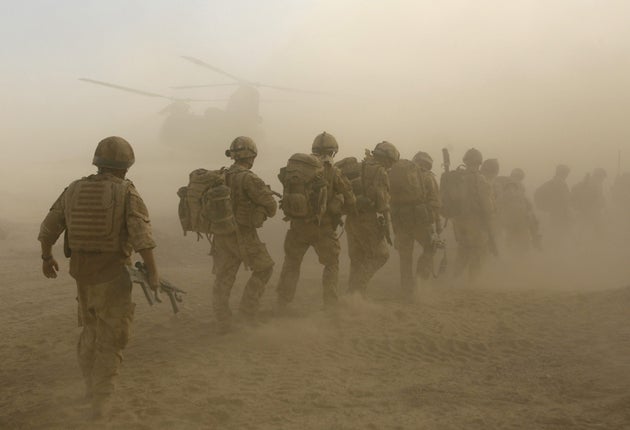Voters turn against war in Afghanistan
Majority thinks conflict is unwinnable and wants troops withdrawn, poll shows

A majority of the public believes that the war in Afghanistan is unwinnable and British troops should be pulled out immediately, a poll for The Independent has found.
The growing opposition to the military offensive emerged as another two UK soldiers were killed, bringing the number of deaths so far this month to 22. Gordon Brown declared yesterday that Operation Panther's Claw – the five-week onslaught on Taliban positions in Helmand province – had been a success.
But today's ComRes survey suggests that the public mood is switching rapidly against the war – and that people do not believe it is worth sending reinforcements to Afghanistan.
More than half of voters (52 per cent) want troops to be withdrawn from Afghanistan straight away, with 43 per cent disagreeing. Opposition to the military action is even stronger among women.
By a margin of nearly two-to-one, the public believes that the Taliban cannot be defeated militarily. Fifty-eight per cent view the war as "unwinnable", with 31 per cent disagreeing.
There is overwhelming agreement – by 75 per cent to 16 per cent – that British troops in Afghanistan lack the equipment they require to perform their role safely.
Despite that, 60 per cent of people do not think more troops and resources should be dispatched to the war zone. Just over one third (35 per cent) are in favour of reinforcements being sent in.
The collapse in confidence in Britain's involvement in Afghanistan comes after the numbers killed in the action exceeded those who died in Iraq.
Mr Brown yesterday announced the first phase of Panther's Claw had been a success, clearing out Taliban insurgents from a wide area of Helmand ahead of next month's Afghanistan elections.
He acknowledged the "tragic human cost" among UK troops who were killed or injured, but insisted it had not been in vain. "What we have actually done is make land secure for about 100,000 people," the Prime Minister claimed.
"What we've done is push back the Taliban – and what we've done also is to start to break that chain of terror that links the mountains of Afghanistan and Pakistan to the streets of Britain."
The two latest deaths brought the total number of UK fatalities in Afghanistan to 191 since the invasion of 2001. One soldier, from the Light Dragoons, died while on a vehicle patrol in Lashkar Gah, the capital of Helmand. It was the first death in Operation Panther's Claw's second stage, which will focus on holding ground won from the Taliban in recent weeks. The second, from 5th Regiment Royal Artillery, died on foot patrol in Sangin district.
The American commander of Nato forces in Afghanistan, General Stanley McChrystal, is due to present his strategic plan for the campaign this week, emphasising that territory taken from the Taliban must be held. In the past, Western troops have been forced to abandon positions due to lack of numbers, allowing the insurgents to return.
For British troops the immediate effect of this is that they must now be present on the ground in large numbers in the areas they have captured. However, senior officers point out it also means that UK forces will not be able to mount such an operation on their own in the future without reinforcements, because troops will be tied up guarding the newly secured areas.
Lt-Gen Simon Mayall, deputy chief of the Defence Staff (Operations), declared: "We cannot afford another Musa Qala." He was referring to the capture of the Helmand town by British troops, who then withdrew after arriving at a deal with local elders. The area turned into an insurgent stronghold from which attacks were planned throughout southern Afghanistan.
Brigadier Tim Radford, who commanded the British troops in Panther's Claw, said: "I am absolutely certain the operation has been a success. We've had a significant impact on the Taliban in this area – both in terms of their capability and their morale. It has been a very, very hard fight.
"When I have been on the ground, you look into the eyes of some of the soldiers and they have certainly grown up during this period."
He refused to confirm how many insurgents were killed in the operation. But he said: "There will be many Taliban who will not be fighting any more."
Ministers are now backing moves by the Afghan government to draw moderate Taliban fighters into the political process by dividing them from hardcore militants.
David Miliband, the Foreign Secretary, speaking at Nato's headquarters in Brussels, said: "The Afghan government needs effective grassroots initiatives to offer an alternative to fight or flight for the foot soldiers of the insurgency. Essentially this means a clear route for former insurgents to return to their villages and go back to farming the land or a role for some of them within the legitimate Afghan security forces."
William Hague, the shadow Foreign Secretary, called for a "comprehensive strategy" for stabilising Afghanistan. He said: "It must include clear, tightly drawn, realistic objectives that are regularly reviewed, more rapid development of Afghan security forces and ensuring battlefield gains are swiftly followed by reconstruction."
ComRes telephoned 1,008 British adults on 24-26 July 2009. Data were weighted by past vote recall. ComRes is a member of the British Polling Council and abides by its rules. Full tables at www.comres.co.uk.
Join our commenting forum
Join thought-provoking conversations, follow other Independent readers and see their replies
Comments